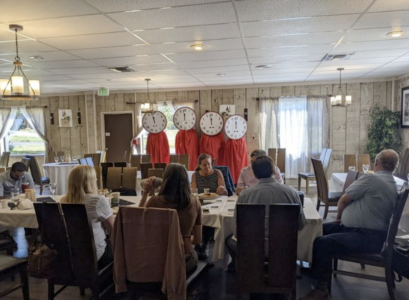
Protestors at the June 2022 AQCC Retreat
ESTES PARK – Environmental groups including 350 Colorado “stopped the clock” at the Air Quality Control Commission’s retreat in Estes Park Thursday, with a message that we are out of time to address climate and air quality issues. Though the initial AQCC retreat plan included a time for public comment according to information released earlier this year, the final agenda had changed to exclude public comment, limiting any public interaction to the “meet and greet.” The public was free to attend the meeting, which included agenda items such as “identify and discuss items for inclusion on the Long Term calendar,” and “Five Years of Progress Combating Air Pollution: a Look Back.”
Protesting members from environmental groups appeared at the AQCC meet and greet with gigantic clock faces pointing two minutes to midnight to convey the urgency of the air pollution and climate crisis. With a spokesperson, they approached the large table where commissioners were seated, and demanded that the Commission 1) increase the urgency of the greenhouse gas reduction targets; 2) acknowledge that oil and gas are the top contributor to ozone in our state and make strong rules for oil and gas in the upcoming ozone rulemaking; and 3) stop delaying rulemakings to put our climate and environmental justice laws into practice.
“I’m not sure why their agenda included celebrating 5 years of progress in air quality when the EPA is downgrading our air quality status from ‘serious’ to ‘severe.’ There is no vacation from Colorado’s awful air pollution. We need bold action from the commission to reign in our ozone emissions and the number one contributor to our air quality problems: the oil and gas industry,” says Dave Robinson, an organizer with Collective for Another World.
HB19-1261 sets emissions reduction targets, and the law explicitly states that the AQCC must make rules to meet these targets “at a minimum.” HB21-1266 restates that the AQCC is authorized to increase the emissions reduction targets beyond those set by HB19-1261. Both laws emphasize Colorado’s commitment to do its part to keep warming to less than 1.5 degrees Celsius. The IPCC states that the world must reach net zero emissions by 2037 to have a 66% chance of staying under 1.5, or zero by 2050 to have a 50% chance. Colorado’s current targets of 90% by 2050 are not strong enough to meet the requirements of HB19-1261 and HB21-1266 to stay under 1.5.
Since Colorado legislators passed HB19-1261 and HB19-1266, several important rulemakings have been delayed or canceled by the APCD/AQCC. The ETRP rulemaking was abandoned and substituted with voluntary measures, and a subsequent law was introduced but failed. The Oil and Gas emissions reduction rulemaking is not completed yet, with a second phase for midstream emissions scheduled for 2024, a full 5 years after the targets were set by Legislature. The GEMM rulemaking, originally scheduled to be completed in 2022 has been delayed into 2023, as has the Clean Trucks and NOx Omnibus rulemaking. The 6-month delay of the Clean Trucks rulemaking, will mean that it won’t take effect for a full model year later (a change from 2026 to 2027), and that disproportionately impacted communities along freight corridors will have to continue to wait for relief from toxic truck pollution.
The EPA has announced Colorado’s Metro Denver and North Front Range will be downgraded from “serious” to “severe,” and the AQCC will have to pass rules developing a new State Implementation Plan. Despite knowing about this planned downgrade for months, and being in nonattainment ever since the EPA passed ozone NAAQS standards in 2008, the AQCC has not scheduled an ozone rulemaking until December. The APCD has publicly stated that it is considering taking credit for previous oil and gas rules to address this downgrade instead of creating new rules for oil and gas. The October 2021 RAQC presentation to AQCC (slide 14) splits oil and gas contributions to ozone into three categories: when these categories are totalled, the contributions of oil and gas equals 1.5 times more than the contribution of cars, and 1.25 times the contribution of all transportation categories.
“I wake up every morning and go to sleep every night thinking of the world we are leaving to the next generation, and what is so frustrating is that we know what to do, but we keep dragging our feet. We can’t keep waiting for someone else to take action tomorrow,” says Heidi Leathwood 350 Colorado’s Climate Policy Analyst.
